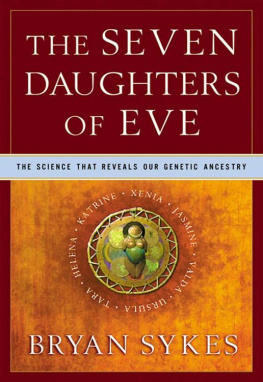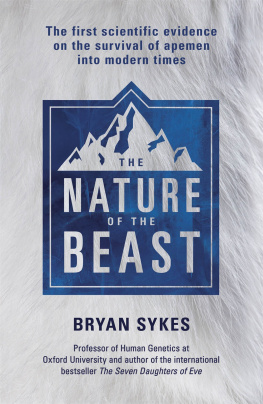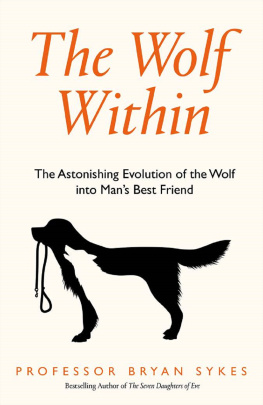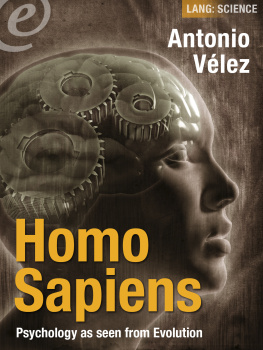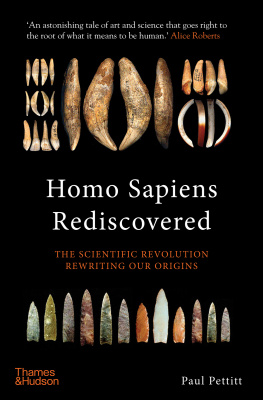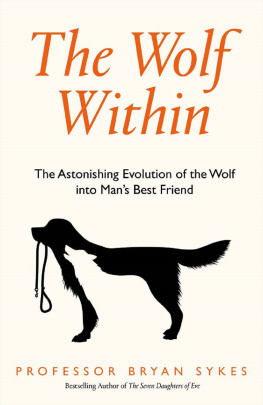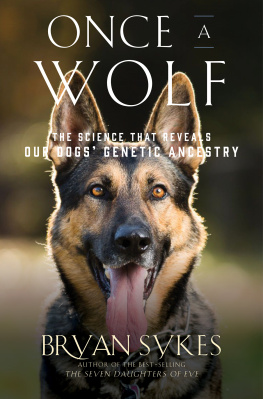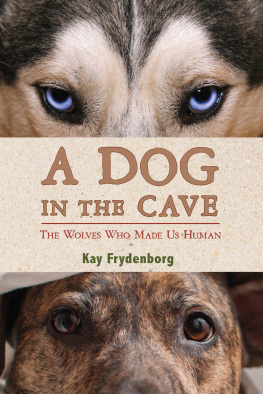Contents
Guide

Once a Wolf
The Science Behind Our Dogs Astonishing Genetic Evolution
Bryan Sykes

Text copyright 2018 by Bryan Sykes
Images copyright individual copyright holders
First American Edition 2019
Originally published in the United Kingdom under the title THE WOLF WITHIN:
The Astonishing Evolution of the Wolf into Mans Best Friend
All rights reserved
For information about permission to reproduce selections from this book, write to Permissions, Liveright Publishing Corporation, a division of W. W. Norton & Company, Inc., 500 Fifth Avenue, New York, NY 10110
For information about special discounts for bulk purchases, please contact
W. W. Norton Special Sales at specialsales@wwnorton.com or 800-233-4830
Production manager: Anna Oler
The Library of Congress has cataloged the printed edition as follows:
Names: Sykes, Bryan, author.
Title: Once a wolf : the science behind our dogs astonishing genetic evolution / Bryan Sykes.
Other titles: Wolf within
Description: First American edition. | New York : Liveright Publishing Corporation, a Division of W.W. Norton & Company, 2019. | Reprint of: The wolf within : astonishing evolution of the wolf into mans best friend. London : William Collins, 2018. | Includes bibliographical references and index.
Identifiers: LCCN 2018055788 | ISBN 9781631493799 (hardcover)
Subjects: LCSH: DogsEvolution. | DogsHistory. | Human-animal relationships. | WolvesEvolution.
Classification: LCC SF422.5 .S935 2019 | DDC 636.7dc23
LC record available at https://lccn.loc.gov/2018055788
ISBN 9781631493805(ebook)
Liveright Publishing Corporation, 500 Fifth Avenue, New York, N.Y. 10110
www.wwnorton.com
W. W. Norton & Company Ltd., 15 Carlisle Street, London W1D 3BS
To Sergio and Ulla

Contents
Preface
This book is about how wolves became dogs. A remarkable transition, it ranks as one of the most important yet least appreciated events in the long history of not one but two species. The wolf changed from a highly successful and independent carnivore into a highly successful yet completely dependent vassal with a bewildering array of different forms. The second species is, of course, ourselves.
All the evidence, which we will examine in this book, traces the start of the transition to about 40,000 years ago somewhere in Eastern Europe. Wolves had been living there and in all of the worlds circum-polar regions for millions of years. Our Homo sapiens ancestors were much more recent players, having newly arrived from Africa only a few tens of thousands of years ago. The scene was set for the encounter that changed the world.
The location was a steep-sided river gorge in the Carpathian Mountains in what is now Romania. There is abundant evidence of human occupation in the region from the time of the Neanderthals to the arrival of our Homo sapiens ancestors, and there is a good fossil record of the fauna to colour in the details.
I hardly need add that the narrative of this meeting, found in I hope you find it evocative.
In 2009 the charismatic actor, Mickey Rourke, was nominated for an Academy Award and won a Golden Globe for his portrayal of over-the-hill fighter Randy The Ram Robinson attempting to make a comeback in the film The Wrestler . The striking parallel between Rourke, the fading actor, and his character, so its said, was the reason behind the popularity of his nominations. In an interview with television host Barbara Walters to coincide with the films release, Rourke said of his own past:
I sort of self-destructed and everything came out about fourteen years ago or so the wife had left, the career was over, the money was not an ounce. The dogs were there when no one else was there.
Asked by Walters if he had considered suicide, he responded:
Yeah, I didnt want to be here, but I didnt want to kill myself. I just wanted to push a button and disappear I think I hadnt left the house for four or five months, and I was sitting in the closet, sleeping in the closet for some reason. I was in a bad place, and I just remember I was thinking, Oh, man, if I do this, [and] then I looked at my dog, Beau Jack, and he made a sound, like a little almost human sound. I dont have kids. The dogs became everything to me. The dog was looking at me going, Whos going to take care of me?
There are tens of thousands of stories like this. Of grown men, and women, lost in the world, who are saved by their dogs.
I am a scientist, a geneticist whose research has concentrated on the human past and our own evolution from upright ape to master of the universe, or so we like to think. It was a natural step for me to wonder at the equally remarkable parallel evolution of the dog that has been so closely tied to our own.
However, and it is best that I come clean right from the start, I am not a dog person. I lay the blame for this unfortunate disposition squarely on the muscled shoulders of the Hound of the Baskervilles, a huge Boxer living down the road from my childhood home in south-east London. From the age of seven, my route to school took me unavoidably past its house, and every day without fail the huge beast flew at the gate, ears flat back on its enormous head, snarling and gnashing its teeth. It was as if the Hell Hound itself had materialised in the London suburbs.
Many decades later, when it was suggested I write a book about the evolution of dogs, the memory of the hound came flooding back. I cant possibly, I answered feebly. But as the weeks passed and I began to do a little research I realised just how fascinating a subject it was and how extraordinary is the everyday sight of a person walking his or her dog. Here was a highly evolved primate and a savage carnivore, whose ancestors were once mortal enemies, living side by side as if it were the most natural thing in the world. My re-education has only gone so far, so please, dear reader, dont expect childhood recollections of playful puppies racing across sunlit beaches or heart-wrenching accounts of how, had it not been for little Bella, I would have been unable to get over the loss of my favourite aunt. My starting point does at least allow me to be objective, even though I feel a little uneasy in being the only author of a dog book that I have come across who is not hopelessly in love with them.
Once a Wolf is primarily a book about the evolution of dogs and the forces that drove this astonishing transformation from a fierce and wild carnivore to the huge range of comparatively docile animals that is the domesticated dog. It is also about the other side of the equation, how it was that our own species Homo sapiens , an equally aggressive carnivore, formed such a special relationship with what, on the face of it, is a most unlikely ally. Once a Wolf contends that this is more than just a story of the subjugation of one species by another but a shining example of the co-evolution of two species to each others mutual benefit. Indeed, I conclude that this co-evolution was one of the vital steps in helping Homo sapiens gain the upper hand in the competition with other human species, such as Neanderthals, and to expand in numbers from relative obscurity towards the overwhelming numerical superiority and influence that we enjoy today.


